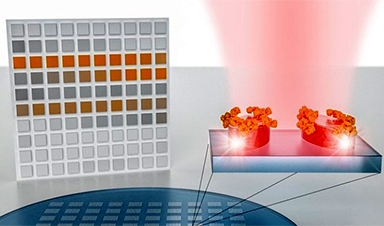EPFL scientists have developed a unique system that can be used for detecting and analyzing molecules with very a level of high precision and without using any bulky equipment. This latest development paves the way for large-scale, image-based detection of materials assisted by artificial intelligence. The study has been reported in Science.
Organic compounds are typically detected and analyzed by infrared spectroscopy, but this method calls for complex procedures as well as huge and costly instruments which make device miniaturization quite difficult and thus limits its applications in certain medical and industrial applications and for collecting data out in the field, for example, for determining the concentrations of pollutants. Infrared spectroscopy is also essentially restricted by low sensitivities and thus needs large amounts of samples.
Conversely, a research team from EPFL’s School of Engineering and Australian National University (ANU) has designed a sensitive and compact nanophotonic system that is capable of identifying the absorption characteristics of a molecule without using traditional spectrometry. The researchers have already detected organic compounds, polymers, and pesticides with their system, which can also be used with CMOS technology.
The novel system features an engineered surface which is surrounded with countless numbers of very small sensors known as metapixels. These metapixels can create a unique bar code for each molecule that the surface comes into contact, and using advanced pattern recognition and sorting technology (for example, artificial neural networks) these bar code can be extensively analyzed. This study – which turns out to be a meeting point of nanotechnology, physics, and big data – has been reported in the Science journal.
Image Credit: © 2018 EPFL
News This Week
New Toothpaste Stops Gum Disease Without Harming Healthy Bacteria
Researchers have developed a targeted approach to combat periodontitis without disrupting the natural balance of the oral microbiome. The innovation could reshape how gum disease is treated while preserving beneficial bacteria. The human mouth [...]
Plastic Without End: Are We Polluting the Planet for Eternity?
The Kunming Montreal Global Biodiversity Framework calls for the elimination of plastic pollution by 2030. If that goal has been clearly set, why have meaningful measures that create real change still not been implemented? [...]
Scientists Rewire Natural Killer Cells To Attack Cancer Faster and Harder
Researchers tested new CAR designs in NK-92 cells and found the modified cells killed tumor cells more effectively, showing stronger anti-cancer activity. Researchers at the Ribeirão Preto Blood Center and the Center for Cell-Based [...]
New “Cellular” Target Could Transform How We Treat Alzheimer’s Disease
A new study from researchers highlights an unexpected player in Alzheimer’s disease: aging astrocytes. Senescent astrocytes have been identified as a major contributor to Alzheimer’s progression. The cells lose protective functions and fuel inflammation, particularly in [...]
Treating a Common Dental Infection… Effects That Extend Far Beyond the Mouth
Successful root canal treatment may help lower inflammation associated with heart disease and improve blood sugar and cholesterol levels. Treating an infected tooth with a successful root canal procedure may do more than relieve [...]
Microplastics found in prostate tumors in small study
In a new study, researchers found microplastics deep inside prostate cancer tumors, raising more questions about the role the ubiquitous pollutants play in public health. The findings — which come from a small study of 10 [...]
All blue-eyed people have this one thing in common
All Blue-Eyed People Have This One Thing In Common Blue Eyes Aren’t Random—Research Traces Them Back to One Prehistoric Human It sounds like a myth at first — something you’d hear in a folklore [...]
Scientists reveal how exercise protects the brain from Alzheimer’s
Researchers at UC San Francisco have identified a biological process that may explain why exercise sharpens thinking and memory. Their findings suggest that physical activity strengthens the brain's built in defense system, helping protect [...]














Leave A Comment